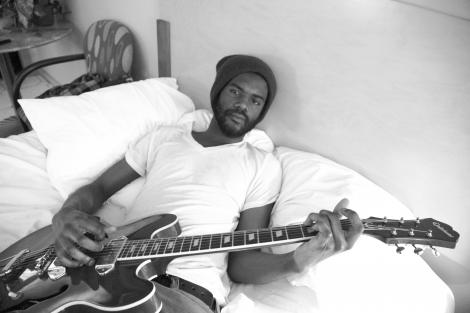“Well you gonna know my name, by the end of the night,” Gary Clark Jr. sings during his take off Jimmy Reed’s blues classic, “Bright Lights, Big City.” The Animals, Rolling Stones, Clapton, Dylan – many have had their take on it, but Clark flipped the tale of urban intoxication, giving it extra bravado and, with a notable performance at the Crossroads Guitar Festival 2010 and resulting Warner Bros record contract, turned it into an announcement of his own impending stardom (with risks involved).
As Clark Jr. walked out onto the stage of the Great American Music Hall Wednesday night it was clear that “Bright Lights” had been working given that the sold out crowd not only knew who he was, but readily sang him “Happy Birthday.” Of course Clark, turning 28, has had plenty of time to build up a following. At 17, in his home of Austin, TX the mayor was already proclaiming a Gary Clark Jr. Day, on account of his prodigious and heralded guitar skills.
It was those skills that people came out to hear at the Great American, and that’s what they got. There’s a lot of ways someone like Clark could go, but at this point in his career, Clark is still more of an old school, straight ahead blues rockers than successful popular contemporaries like Jack White or the Black Keys’s Dan Auerbach.
Clark opened the night with a couple tracks from his The Bright Lights EP. With “When My Train Pulls In,” he set a simple rule – the length of the songs would be less structured around the verses and would instead go as long as he wanted to solo. That one’s a bit heavier and slow, but he followed it up with “Don’t Owe You A Thang,” a catchy number built from some Bo Diddley-esque guitar playing. Clark would alternately double time or halve the solos, but kept the number well balanced by coming right back in with forceful vocals right before a shift in beat.
As he worked through a set that consisted of some covers and some originals, it was clear that Clark was experimenting with a number of styles, with mixed results. Compared to the confidence on display in “Don’t Owe You A Thang” and “Bright Lights,” the fluttery soul piece, “Things Are Changin’” had a John Meyer quality to it that I found unappealing. Almost reading my mind, Clark finished playing the number and said, “So enough of that sweet soft stuff, we’re about to get crazy up in here.” After a noisy intro that recalled another Austin guitar hero, Eric Johnson, the band started breaking the beat down more, playing “If You Love Me Like You Say,” with a big funky drummer solo, over which Clark pulled out some tricked out technique that sounded more like scratching on vinyl than anything I was expecting.
After a set involving a couple of real stretched out numbers, Clark met expectations with “Bright Lights.” But as he walked off stage it seemed like a number of people either had enough or got what they wanted, not waiting for the encore. People still called for it, though, and the guitarist returned, first without his band, saying “I want some alone time with you guys,” softly playing a couple songs. Anyone who left missed out, as the band came back on stage to closed the night with Curtis Mayfield’s “Move On Up.” It’s a song that’s hard for almost anyone to cover, particularly if they lack a really good horn section. But at Clark Jr.’s hands, it didn’t seem like anything was missing.
1. When My Train Pulls In
2. Don’t Owe You A Thang
3. ?
4. Please Come Home
5. Things Are Changing
6. If You Love Me Like You Say (Albert Collins)
7. 3 O’Clock Blues (Lowell Fulson)
8. ?
9. Bright Lights
Encore
10. When The Sun Goes Down
11. Freight Train (Elizabeth Cotten)
12. Move On Up
Openers:
Aren’t there a lot of bands right now with White Something as their name? In any case, when the White Buffalo finished its set, someone next to me remarked “Man, I wish there were encores for openers. I could go home right now and been glad I heard that.” For my part I could have stood to hear some more of the first opener, White Dress, particularly the twangy, smoky voice of Arum Rae, who seems to do equally well with or without accompaniment.

